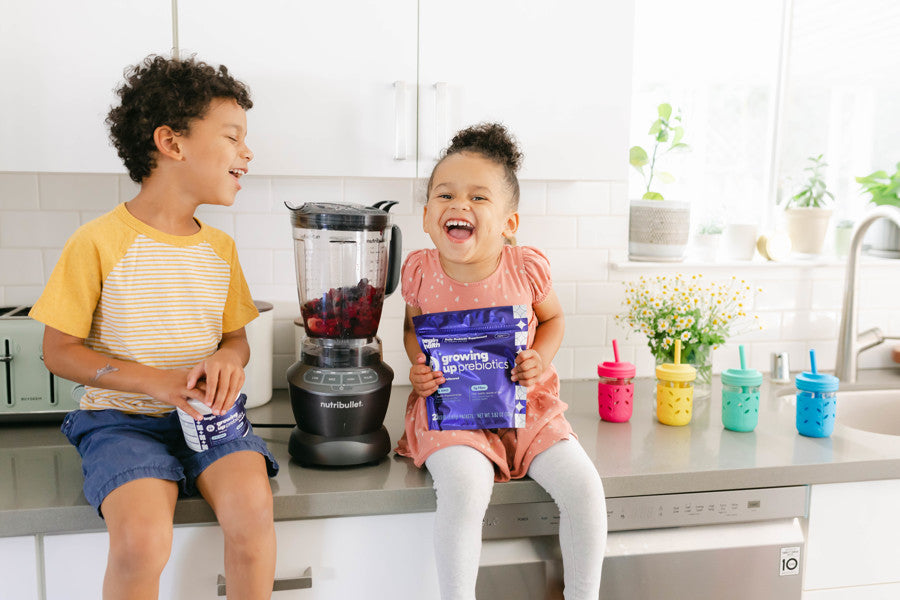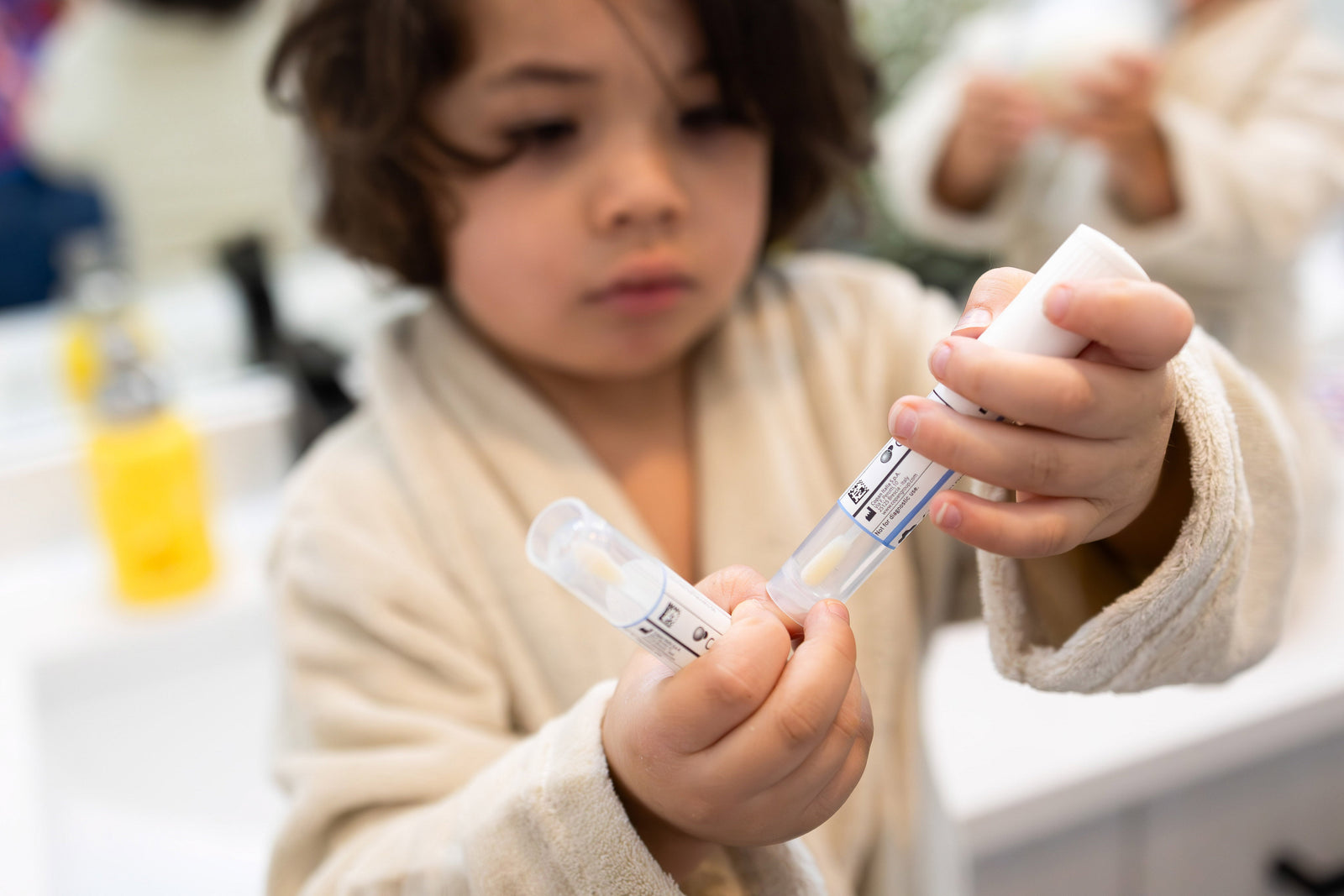Your Cart is Empty
Continue shoppingWhy A Pediatric Doctor Recommends Bifidobacteria for Infant Gut Health with Dr. Jordi Smith
Medically reviewed by Dr. Jordi Smith | Published October 01, 2023
share this article

When it comes to probiotics for infants and kids, there’s no one-size-fits-all approach. Probiotics are differentiated by strains and each strain has its own special function. Every infant also has a unique gut microbiome, so the best probiotic for your little one may be different from the ideal choice for someone else.
To get the most benefits of probiotics, you need to find the strain targeted to your specific health goals. One probiotic strain that has been well-researched in infants and kids is a bacteria called Bifidobacteria. Let's review why Bifidobacteria is beneficial for gut health in infants.
Improved Digestion
A kid’s gut is similar to a bustling city, filled with numerous microbes. Bifidobacteria in particular plays a pivotal role by facilitating digestion and helping in the absorption of vital nutrients, ultimately creating the foundation for optimal infant gut health [1]. Specifically, Bifidobacterium breve helps prevent constipation in kids and can also help alleviate abdominal pain [2]. Nutrients are efficiently utilized when the gut thrives. This can help your little one’s overall growth and development.
Begin Health Expert Tip
Introducing a toddler and kid’s prebiotic such as Begin Health’sGrowing Up Prebiotics supercharges this process by providing nourishment to Bifidobacterium, offering further digestive support for your kiddos. For more information regarding how prebiotics can help your kid’s digestion, check out our blog on Reasons Why Prebiotic Fiber is Essential for Kids’ Gut Health.
Colic Relief
Colic is characterized by frequent, prolonged, and intense crying. This can be distressing for both infants and parents. Recent research suggests that Bifidobacteria can significantly reduce colic symptoms [3]. In my experience, it is recommended to provide 5-10 billion CFUs of this strain when it comes to supporting infants with colic. This not only brings tranquility to the infants but also paves the way for rejuvenating sleep for fatigued parents. Nurturing gut health can not only indirectly impact overall infant well-being, but provide parents with relief from their little one’s cries as well.
Immune System Support
Creating a strong foundation for immunity is pivotal in the early years. Consuming probiotics in the form of bifidobacteria can help build a stronger immunity as your kiddo’s digestive system matures, since 80% of the immune system is located in the gut [8]. Friendly gut bacteria such as B. infantis, a type of bifidobacteria, have been shown to bolster the immune system, potentially reducing the risk of infections and allergies [4]. In an era where pathogens are everywhere in our environment, solidifying our kid’s immunity is essential, particularly when it's time to venture out, like back to school.
Begin Health Expert Tip
For more tips on how to support your kid’s immunity for back to school, check out our blog here on Immunity Tips for Kids.
Daily reads to help your little ones lead happier and healthier lives.
Buy Now
Join the
Happy Gut Club
Diarrhea Prevention
Diarrhea, particularly in recurrent forms, is a significant concern in pediatric care. B. infantis has been associated with a reduction in episodes of diarrhea, especially those induced by antibiotics or rotavirus [5]. In addition to consuming probiotics that contain bifidobacteria, introducing a prebiotic like Growing Up Prebiotics at the same time to your kiddo’s diet or Beginbaby Prebiotic + Probiotic for infants can help boost the overall amount of bifidobacterium. Utilizing both a probiotic and prebiotic together can further boost this defense mechanism to help reduce episodes of diarrhea in your little one’s daily life.
Bowel Movement Regulation
Addressing constipation in toddlers or even chronic constipation is a battle every parent wishes to avoid. Research suggests that B. infantis can support efforts in promoting consistent bowel movements [6], ensuring a comfortable and tear-free toilet experience. For persistent issues, medical testing for pediatric constipation can provide more insights, but regularity starts with a balanced gut.
Begin Health Expert Tip
For a more targeted approach to discover the root of your little one’s digestive issues, check out our Kiddo Poop Test - specifically designed to detect any gut imbalances and provide parents with actionable insights to improve their kiddo’s gut health.
Anti-Inflammatory Properties for Inflammation Support
Inflammation, particularly chronic, can have detrimental effects on an infant's gut. Bifidobacteria, specifically B. infantis, have been recognized for their anti-inflammatory properties to provide a natural approach to manage gut inflammation [7]. This not only provides a holistic way for gut support in kids but also will help with fewer episodes of digestive discomfort.
Summary
Incorporating probiotic-rich foods or supplements can boost your little one's Bifidobacteria levels, promoting gut health from infancy. For infants not yet on solid foods, daily prebiotic + probiotic supplements for infants such as Begin Health's Beginbaby Pre + Pro can help build a strong microbiome, support digestion, and build a healthy start to life.

Author
Dr. Jordi Smith
Trending

Why Parents Are Choosing Prebiotics Over Stool Softeners for Kids
read now
Oxalates and Kids' Digestion: How High-Oxalate Foods Contribute to Constipation and Gut Discomfort
read now
5 Signs Your Toddler Needs a Poop Test
read now






